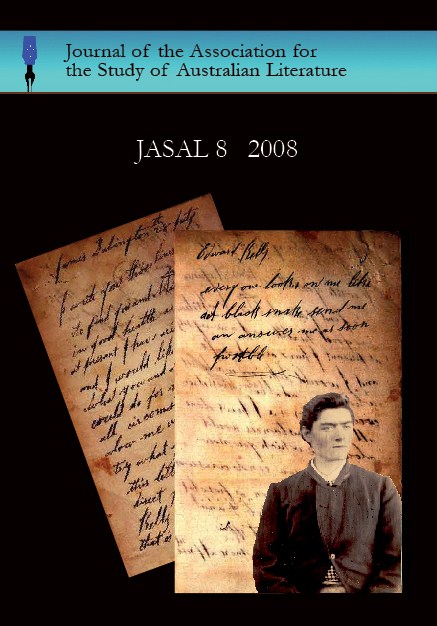Ghosts in the Machine: Modernity and the Unmodern in Gail Jones's Dreams of Speaking
Keywords:
Gail JonesAbstract
Gail Jones’s first three novels deal with Australians who travel or live abroad and engage with aspects of modern global culture. In Black Mirror (2002), an Australian artist moves to Paris in the 1930s and becomes part of the surrealist movement; years later, another Australian woman, an art historian, follows her to Europe to research her biography. Sixty Lights (2004) begins in Australia but the action soon moves to London and then to India, thereby locating Australia within the international landscape of the late nineteenth-century British world. In Dreams of Speaking (2006), an Australian academic, Alice Black, travels from Perth to Paris to research a book on ‘the poetics of modernity’. She there meets an elderly Japanese man, Mr Sakamoto, who is also interested in modernity and its technologies, and who is writing a biography of Alexander Bell, the inventor of the telephone. Alice’s project begins as a theoretical enterprise, as she sets out to understand the operations of global modernity and the nature of modern time and space. Yet in the opening pages of the novel, after her return from Paris, her manuscript lies abandoned on her desk like ‘something dead and unconnected’ (6). In this paper, I examine how her meeting with Mr Sakamoto and her grief for his death cause her to abandon that initial project for one of a different kind, which involves her telling the story of their friendship. Alice’s recognition that modernity is haunted by the persistence of the unmodern, especially death and mourning, transforms her poetics of modernity into a meditation on the ethics of friendship.Downloads
Published
2008-09-03
Issue
Section
Articles
License
The copyright for articles in this journal is retained by the author(s), with first publication rights granted to the journal. By virtue of their appearance in this open access journal, articles are free to use with proper attribution in educational and other non-commercial sectors.Attribution-NonCommercial-ShareAlike 2.1 Australia
This work is licensed under the Creative Commons Attribution-NonCommercial-ShareAlike 2.1 Australia License. To view a copy of this license, visit http://creativecommons.org/licenses/by-nc-sa/2.1/au/ or send a letter to Creative Commons, 543 Howard Street, 5th Floor, San Francisco, California, 94105, USA.
How to Cite
Ghosts in the Machine: Modernity and the Unmodern in Gail Jones’s Dreams of Speaking. (2008). Journal of the Association for the Study of Australian Literature, 8, 121-137. https://openjournals.library.sydney.edu.au/JASAL/article/view/9738

